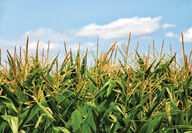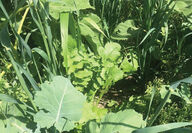Sorted by date Results 126 - 150 of 247

Drought conditions across North Dakota have created major issues for livestock and crop producers. Many are facing poor grazing conditions, reduced hay production, limited stored forages and anticipated poor grain yields. Producers have begun harvesting corn for forage instead of grain. Drought-stressed corn will vary in forage quality based on grain fill, plant height and maturity across fields. Limited grain fill means the forage will contain less starch, greater crude protein and fiber with...

The North Dakota State Board of Agricultural Research and Education (SBARE) is seeking public input on needs in the state. SBARE provides the state Legislature and governor with recommendations on how the North Dakota Agricultural Experiment Station and North Dakota State University Extension can address critical state needs and ensure that the state's investments on behalf of North Dakota citizens will yield great long-term dividends. The input will help shape SBARE's recommendations for the 20...

The drought in North Dakota is impacting the yield of small-grain crops such as barley, oats, rye, triticale and wheat, leading some producers to harvest the small grains as hay. The severe lack of moisture also has impacted this year's hay production and many producers are seeking alternative, possibly nontraditional, sources of forage such as cattails, flax, kochia, millet varieties and soybeans. "With limited forage on the market and high prices, it may be a better option to evaluate local...

Following years of field research on soybean planting rates and/or row spacing, North Dakota State University Extension agronomists are updating their recommendations for establishing soybean stands. Their long-term recommendation has been 150,000 plants per acre across row spacings. In 2020, Greg Endres and Hans Kandel, NDSU Extension agronomists, compiled and evaluated data from 37 NDSU trials conducted during 2008 - 2019 across the state. "The objective was to provide a more precise guide for...

Weather forecasts predict worsening drought conditions in the northern Great Plains for the 2021 growing season, which is bad news for cattle producers. Many cattle operations will find themselves without enough forage and feedstuffs to maintain their current herd size. "Unfortunately, often decisions are made more with emotion than logic during stressful times," says Lisa Pederson, Extension livestock specialist at North Dakota State University's Central Grasslands Research Extension Center...

Using manure as fertilizer can lead to the spread of noxious and troublesome weeds. "It is a known fact that weed seeds pass unharmed through the digestive tracts of ruminant animals (cattle, sheep)," says Mary Keena, livestock environmental management specialist based at North Dakota State University's Carrington Research Extension Center. "This means that whatever weed seeds are in the feed or bedding you're using are still viable when they exit the animal as manure. "There is also a line of...

Calf abortions can be a major concern for cattle producers. An abortion is the discharge of the fetus prior to the end of the normal gestation period, according to Gerald Stokka, North Dakota State University Extension veterinarian and livestock stewardship specialist. Many abortions occur within the first 45 days of conception (called early embryonic death), and the embryos or fetuses are so small that they may not be seen. Other abortions may occur near normal calving time, and determining...

A statewide citizen science network is looking for volunteers for rain and snow reporting in North Dakota. These observers will measure rainfall, snowfall and snow depth as part of the Community Collaborative Rain, Hail and Snow (CoCoRaHS) Network. Observers also are encouraged to measure the water equivalent of the snow after it melts, although that is optional. "This is your chance to become part of the state's climatological history and contribute to an accurate flood potential forecast in...

Producers and others will have an opportunity to learn more about tile drainage during an online tile drainage design and management webinar North Dakota State University Extension is holding from 8:30 a.m. to noon March 25. "This tile design educational event is intended for agricultural producers and those interested in understanding basic design principles and agronomic practices for tile drainage, including utilizing subirrigation and managing the water table with control boxes," says Hans...

North Dakota growers continue to be the No. 1 producers of sunflowers in the U.S., harvesting 715,000 acres of the crop in 2020. Sunflowers are harvested for oil, confection uses and bird food. Each sunflower variety has distinctive agronomic characteristics that producers should consider when selecting a hybrid to grow. "Choosing a hybrid and using proper agronomic practices are important decisions a producer makes in raising a successful crop," says Hans Kandel, a North Dakota State...

Winter and early spring calving can lead to health risks for the newborns, North Dakota State University Extension livestock specialists caution. This winter's mild weather has created calving conditions that are favorable to the producer and the livestock. However, colder temperatures and wind are still a risk to newborn calves. Hypothermia can result, which leads to delayed nursing, frozen ears, frozen feet and an increased risk of infectious disease. Calving indoors can alleviate some of...

Producers and crop advisers will have an opportunity to learn more about canola production during the Getting it Right in Canola Production online conference that North Dakota State University Extension, with support from the Northern Canola Growers Association, is holding from 8:30 a.m. - noon Tuesday, March 16. Canola is a major oil crop in the northern Great Plains, particularly in North Dakota. In 2020, North Dakota accounted for nearly 1.5 million harvested acres, approximately 83% of all a...
Soybean producers and crop advisers will have an opportunity to learn about soybean production management issues during the 2021 Getting it Right in Soybean Production online conference that North Dakota State University Extension, with support from the North Dakota Soybean Council, is holding from 8:30 to 11 a.m. Wednesday, Feb. 17. “Crop production depends on many decisions, and new research-based production information is generated annually,” says Hans Kandel, Extension agronomist for broadleaf crops. “Therefore, it is important for produ...
The North Dakota State University Extension projected crop budgets for 2021 are available for the state’s producers, says Ron Haugen, NDSU Extension farm management specialist. The 2021 projected profits vary by region and crop. “The budgets are guides for large multicounty regions,” says Haugen. “Returns and costs can vary considerably between producers within a region. Also, the budgets estimate returns to labor and management with no consideration of price and yield variability or risk. A perfect comparison of crops is not achieved because...

On Feb. 11, the North Dakota 4-H Foundation will participate in the Dakota Medical Foundation's annual Giving Hearts Day, a 24-hour online fundraising event for charities in North Dakota and northwestern Minnesota. The North Dakota 4-H Foundation is a nonprofit organization that secures and manages financial resources to support and expand North Dakota's 4-H programs and educational opportunities in areas such as healthful living, engineering and technology, animal and plant sciences,...

Soil samples in North Dakota indicate lower levels of overwintering wheat midge larvae (cocoons) for the 2021 season, says Janet Knodel, North Dakota State University Extension entomologist. A total of 2,050 soil samples were collected from 22 counties in the fall of 2020 to estimate the statewide risk for wheat midge in the 2021 field season. The distribution of wheat midge is based on unparasitized cocoons found in the soil samples. "The majority of the soil samples, 86%, had zero wheat midge...

North Dakota State University Extension has updated the Crop Compare program, which is a spreadsheet designed to compare cropping alternatives. The program uses the direct costs and yields from the 2021 projected crop budgets for nine regions of North Dakota, but producers are encouraged to enter the expected yields and input costs for their farm. The user designates a reference crop and enters its expected market price. Depending on the region, a broad selection of nine to 18 crops are...

Irrigation provides more consistent crop production on a year-to-year basis, allows growth of longer-season crops, diversifies the farm enterprise and provides a consistent supply of forage for animal operations. "However, managing an irrigation system around variable rain events can sometimes be a challenge for busy farmers," says Tom Scherer, North Dakota State University Extension agricultural engineer. To provide producers with some assistance, NDSU Extension is holding a virtual irrigation...

The Oliver County 4-H range judging team placed first in the senior division of the North Dakota 4-H and FFA range judging contest at Center. Team members are Breanna Hosman, Hebron; Olivia Klein, Max, and Reanna Schmidt, Katie Frank, Breanna Vosberg and Rylee Hintz, Center. Hosman received the Head of the Herd Award as the top-scoring individual in the 4-H division. The Oliver County team is coached by Rick Schmidt. The team will represent North Dakota at the National Invitational 4-H Range...

North Dakota producers need to be vigilant about keeping Palmer amaranth, a particular noxious weed, off their land, according to North Dakota State University Extension specialists. This weed has been found in new North Dakota counties every year since 2018, and 2020 was no exception. One source of introduction in 2020 was through contaminated grain screenings. Samples pulled from a pile of sunflower screenings detected up to 1,000 Palmer amaranth seeds per pound of screenings from one source....
The Oliver County 4-H range judging team placed first in the senior division of the North Dakota 4-H and FFA range judging contest at Center. Team members are Breanna Hosman, Hebron; Olivia Klein, Max, and Reanna Schmidt, Katie Frank, Breanna Vosberg and Rylee Hintz, Center. Hosman received the Head of the Herd Award as the top-scoring individual in the 4-H division. The Oliver County team is coached by Rick Schmidt. The team will represent North Dakota at the National Invitational 4-H Range Judging Contest in Oklahoma in the spring of 2021....

Rainfall ranks as one of the most important factors that influence ranchers' management decisions, according to North Dakota State University Extension specialists. This year is no different. Parts of North Dakota are experiencing severe dry weather while others have adequate to plentiful moisture. This situation drives management of native pasture, crop residue and cover crop acres. Typically, even with good moisture at this time of the year, the nutritional value of native pasture is in declin...

Changes in federal grazing and harvesting rules on prevented-planting acres could help North Dakota livestock producers in select counties replenish forage supplies, or at least offset shortages in perennial forage production, according to North Dakota State University Extension livestock specialists. The U.S. Department of Agriculture (USDA) will allow producers to graze, hay or cut cover crops on prevented-planting acres beginning Sept. 1. Counties included in the change are: Barnes, Benson,...

Several hundred thousand head of cattle are on U.S. roadways every day, and given the volume of cattle being transported, the likelihood of a truck being involved in an accident is high. However, first responders and law enforcement officers aren't always trained in how to handle an incident with cattle. As a result, North Dakota State University Extension specialists joined university and Extension faculty from across the country in developing the Bovine Emergency Response Plan (BERP) and...

The U.S. Department of Agriculture (USDA) has released regulations for direct payments under the Coronavirus Food Assistance Program (CFAP). "CFAP provides vital financial assistance to producers of agricultural commodities who have suffered a 5% or greater price decline due to COVID-19 and face additional significant marketing costs as a result of lower demand, surplus production and disruptions to shipping patterns and the orderly marketing of commodities," says Ron Haugen, North Dakota State...